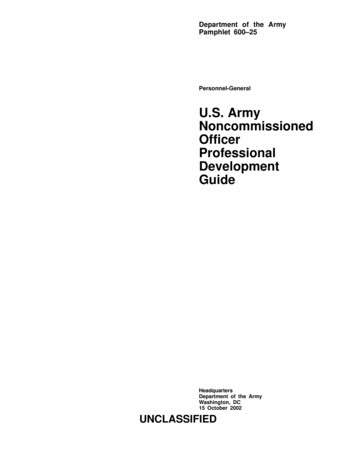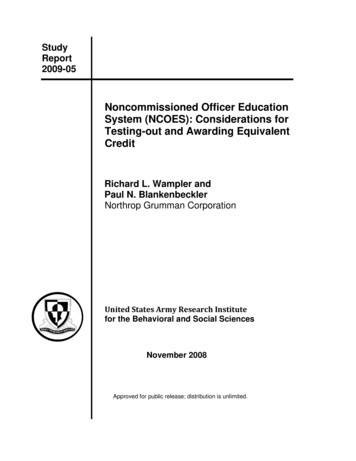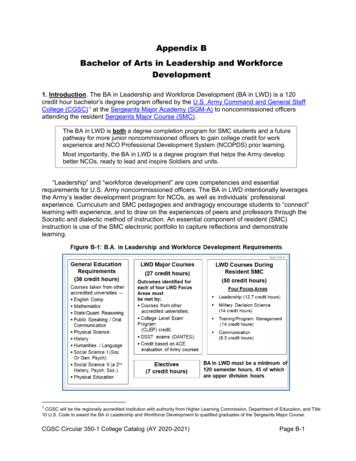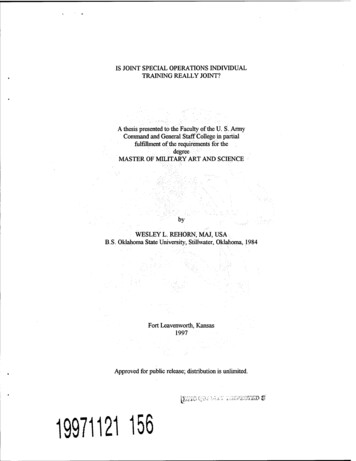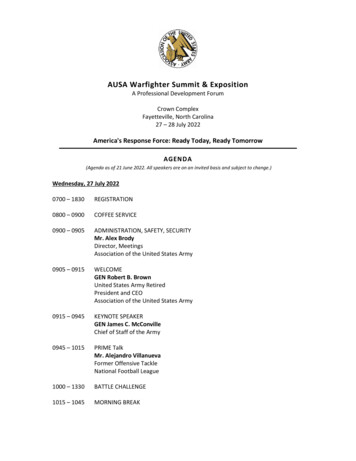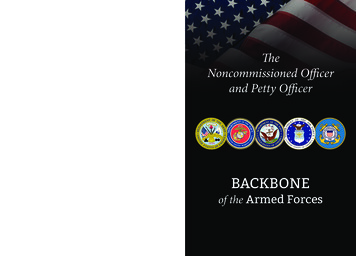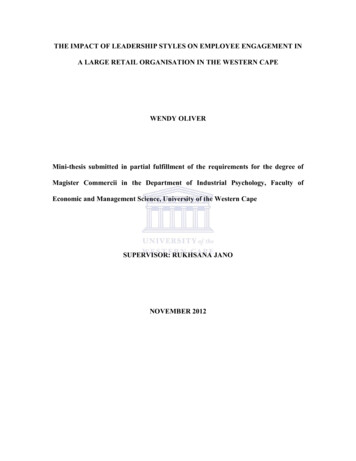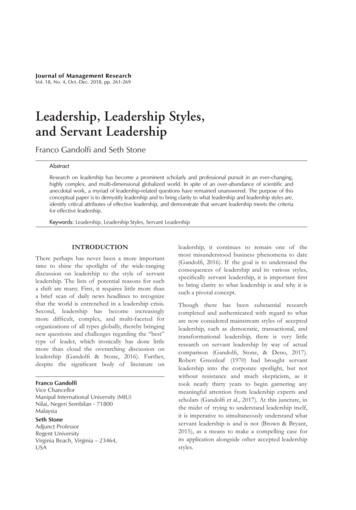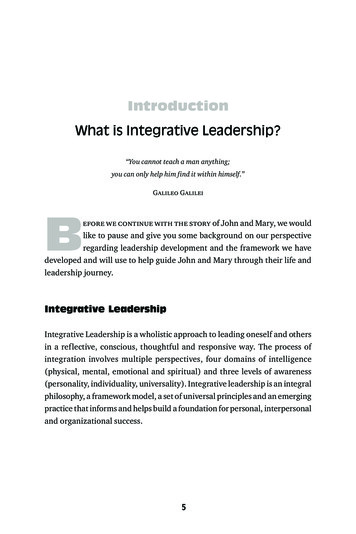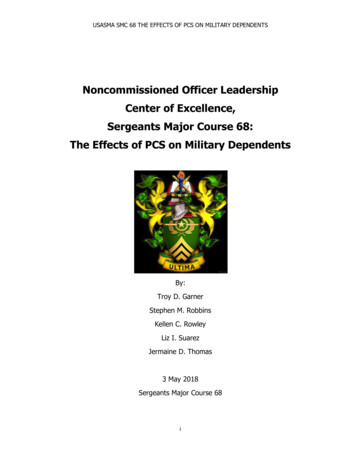
Transcription
USASMA SMC 68 THE EFFECTS OF PCS ON MILITARY DEPENDENTSNoncommissioned Officer LeadershipCenter of Excellence,Sergeants Major Course 68:The Effects of PCS on Military DependentsBy:Troy D. GarnerStephen M. RobbinsKellen C. RowleyLiz I. SuarezJermaine D. Thomas3 May 2018Sergeants Major Course 68i
USASMA SMC 68 THE EFFECTS OF PCS ON MILITARY DEPENDENTSTable of ContentsPageThe Effects of PCS on Military Dependents .iTable of Contents . .iiTable of Figures . .ivDisclosure . .viiAcknowledgements . .viiiExecutive Summary . ixAuthor’s Biographies x1. Introduction and Background .12. Literature Review . . .3Healthcare . .4Social Effects 8Psychological Effects .10Employment .12Education . .143. Research Methods . .17Methods 18Participants . 18Materials .19Design . .19Procedures .20Data Methods 214. Healthcare 245. Social Effects .396. Psychological Effects .547. Employment .60ii
USASMA SMC 68 THE EFFECTS OF PCS ON MILITARY DEPENDENTS8. Education .669. Summary . 7110. Recommendation . .75Appendices .79A. Appendix A: Survey . .80B. Appendix B: Statistical Analysis . 86C. Appendix C: Demographics . .125iii
USASMA SMC 68 THE EFFECTS OF PCS ON MILITARY DEPENDENTSTable of FiguresPageFigure 4.1 Respondents with Dependents Enrolled in EFMP . 24Figure 4.2 Respondents with Dependents Requiring IEP . .25Figure 4.3 PCS Effect on Tricare .26Figure 4.4 Effect of PCS on EFMP Services . 27Figure 4.5 Effect of PCS Continuity of Care for Dependents . .28Figure 4.6 Effect of PCS on IEP Continuity of Care for Dependents . 29Figure 4.7 Respondents Who Have PCS’d with Family Due to Dependents HealthcareIssues . .30Figure 4.8 Does EFMP Cover All Dependents Needs?.31Figure 4.9 Satisfaction with EFMP Process to Report Problems . .32Figure 4.10 Is EMFP Responsive to Problems with Dependent Healthcare?.33Figure 4.11 Was EFMP Responsive to Report Problems Adequately?.34Figure 4.12 Factors That Impede Dependents from Seeking Help .35Figure 4.13 Adequate Medical Intervention When a Dependent Demonstrates Issueswith Medical, Educational, or Behavioral Health . .36Figure 4.14 What Is the Ideal Length of Tours to Improve EFMP Services?.37Figure 5.1 Effectiveness of Relocation Readiness Program 40Figure 5.2 Effectiveness of Army Sponsorship Program 40Figure 5.3 Effectiveness of On-Post Housing Program .41Figure 5.4 Effectiveness of MWR Facilities .41Figure 5.5 Effectiveness of Military One Source program 42Figure 5.6 Effect of PCS on Extracurricular Activities . 43Figure 5.7 Effect of PCS on Social Connections and Activities .44Figure 5.8 Improvement of Military Programs 45Figure 5.9 Would Longer Tours Improve Social Connections?.46Figure 5.10 Spouse Lost Job Due to PCS .47iv
USASMA SMC 68 THE EFFECTS OF PCS ON MILITARY DEPENDENTSFigure 5.11 Effect of PCS on Spouse’s Earnings . 48Figure 5.12 Effectiveness of Employment Readiness Program .49Figure 5.13 Effectiveness of MYCAAS .49Figure 5.14 Would Longer Tours Improve Spouses’ Employment Opportunities?.50Figure 5.15 Respondents with Dependent Children . .51Figure 5.16 Dependent Children Age Group . .52Figure 5.17 Effectiveness of Family Resilience Training 53Figure 6.1 Percent of Dependents Who Received Behavioral Health Services. . .55Figure 6.2 Type of Dependents that Have Received Behavioral Health Services 56Figure 6.3 Number of Years Dependents Received Behavioral Health Services .56Figure 6.4 How Military Dependents Feel About Behavioral Health Services 57Figure 6.5 Rating of Family Communication Skills 58Figure 6.6 Rating of External Family Support System 59Figure 7.1 Number of Spouses Currently Employed . .60Figure 7.2 Effect of PCS on Opportunities to Get a Job . .61Figure 7.3 Job Opportunities in a Particular Field 62Figure 7.4 Underemployed . . .63Figure 7.5 Spouses with Lower Pay Jobs After PCS . .64Figure 7.6 Considered Separating from the Military to Improve Spouse’s JobOpportunities . .65Figure 8.1 Effect of PCS on Children’s Educational Development 66Figure 8.2 Experienced Significant Difference in Quality of Education for YourDependents After Relocations . .67Figure 8.3 Considered Separating from the Military to Support or Improve Spouse’sEducational Opportunities .67Figure 8.4 Considered Separating from the Military to Support or Improve Children’sEducational Opportunities . 68v
USASMA SMC 68 THE EFFECTS OF PCS ON MILITARY DEPENDENTSFigure 8.5 PCS Without Family to Improve Their Educational Stability . 69Figure 8.6 Would Longer Tour of Duties Improve your Dependents EducationalOpportunities?.70vi
USASMA SMC 68 THE EFFECTS OF PCS ON MILITARY DEPENDENTSDisclosureUTEP MPA students undertook this report as a Capstone project. The views and analysisexpressed in this research report are those of the authors and not necessarily those ofthe United States Army or United States Army Sergeants Major Academy.vii
USASMA SMC 68 THE EFFECTS OF PCS ON MILITARY DEPENDENTSAcknowledgementWe would like to give a special thank you to the United States Army Sergeants MajorAcademy leadership for allowing students from the University of Texas at El Paso Masterof Public Administration program to conduct our capstone research project on theUSASMA campus. We would also like to thank all the Sergeant Major Course Students ofClass-68 who took time from their busy schedule to participate in and complete oursurvey. Your feedback is instrumental in identifying and providing a comprehensiveunderstanding of the impact that a permanent change of station move has on a militaryfamily. We are highly indebted to Command Sergeant Major Jimmy Sellers, CommandSergeant Major Nuuese Passi, and Sergeant Major Reginald Gooden for their guidanceand constant supervision as well as for providing necessary information regarding theproject & also for their support in its completion. Again, thank you from all five of UTEPMPA program students.viii
USASMA SMC 68 THE EFFECTS OF PCS ON MILITARY DEPENDENTSExecutive SummaryThis report studies how frequent permanent changes of station (PCS) for activeduty US Army members enrolled at the United States Army Sergeants Major Academy(USASMA), class 68 affect their dependents. Previous research has found that militarydependents are critically impacted in areas such as medical services, education,employment, and social programs. Students from the University of Texas at El Paso,Master of Public Administration Capstone program conducted a Dependent Quality of Life(QoL) survey in March, 2018 that consisted of 392 USASMA students out of a totalpopulation of 706. A hard copy survey questionnaire, which consisted of 34 questions,was provided to 392 students. The questions were a combination of multiple choice andcategory selections that pertained to Tricare services, behavioral health services,exceptional family members programs (EFMP), spousal employment, and dependenteducation.ix
USASMA SMC 68 THE EFFECTS OF PCS ON MILITARY DEPENDENTSAuthor BiographiesTroy D. GarnerTroy D. Garner is from Mount Holly, VA and has served in the U.S. Army for 19 years inthe Armor force. He is currently a geographical bachelor in El Paso, TX. His wife Shanaand two children currently reside in Harker Heights, TX. He presently serves as astudent of the USASMA Resident Course (Class 68). His education includes a Master ofPublic Administration from the University of Texas at El Paso and a Bachelor degree inCriminal Justice from Troy University.Stephen M. RobbinsStephen M. Robbins is from Fort Myers, FL and has served in the U.S. Army for 22 years.He currently resides in El Paso, with his wife Rachel and daughter Ava. He has an olderdaughter, Megan, who is attending the University of Colorado. He presently serves as astudent of the USASMA Resident Course (Class 68). His education includes a Master ofPublic Administration from the University of Texas at El Paso and a Bachelor of ScienceDegree in Psychology from Coastal Carolina University.Kellen C. RowleyKellen C. Rowley is from Rochester, NY and has served the Army for 16 years in the AirDefense Artillery. He currently resides in El Paso, Texas with his wife Doris and threeboys, where he serves as a student in the USASMA Resident Course (Class 68). Hisx
USASMA SMC 68 THE EFFECTS OF PCS ON MILITARY DEPENDENTSeducation includes a Master of Public Administration from the University of Texas at ElPaso and a Bachelor degree in Criminal Justice from American Military University.Liz I. SuarezLiz Suarez is from Caracas, Venezuela. She has worked for the Fort Bliss InstallationCommand as an Auditor in the Internal Review and Audit Compliance office for the pastfour years and as an Army Civilian Employee for over eight years. She currently residesin El Paso, TX with her husband William, who is a USASMA Resident Course (Class 68)student, along with their three children. Her education includes a Master of PublicAdministration from the University of Texas at El Paso and a Bachelor degree inAccounting with a minor in Business Administration from the University of MarylandUniversity College.Jermaine D. ThomasJermaine Thomas is from Detroit, Michigan and has served in the U.S. Army for 21 years.He currently resides in El Paso. He presently serves as a student of the USASMAResident Course (Class 68). His education includes a Master of Public Administrationfrom the University of Texas El Paso and a Bachelor of Science Degree in BusinessAdministration from Columbia Southern University.xi
USASMA SMC 68 THE EFFECTS OF PCS ON MILITARY DEPENDENTSIntroductionFive students attending the University of Texas El Paso’s (UTEP) Master of PublicAdministration (MPA) program conducted a capstone research project gathering datawith the aim of lowering the effects of a PCS on military dependents. The purpose ofthis research is to identify and provide the leadership of the United States ArmySergeants Major Academy (USASMA) with an analysis and recommendation of theeffect of PCS on military families.BackgroundThe student population for USASMA, SMC Class 68, 2017-2018 numbered 706individuals. Students selected to attend the United States Army Sergeants MajorAcademy have diverse demographic backgrounds that may require specialconsiderations such as Healthcare, the Exceptional Family Member Program, SocialEffects, Psychological Effects, Employment, and Education. As UTEP MPA students, wewanted to conduct a capstone project that would provide valuable information toleadership of USASMA for future SMC classes. The research emphasis during datacollection focused on opinions regarding the topics stated above.Data collection consisted of 750 paper copy questionnaires distributed by fiveMPA students during a one-day period on the USASMA campus. A total of 392questionnaires were completed and returned. To maximize participation, the use ofpaper surveys allowed for maximum data to be collected immediately after a briefing inthe East Auditorium, with all USASMA students attending. This survey method provided1
USASMA SMC 68 THE EFFECTS OF PCS ON MILITARY DEPENDENTSlow cost, quick data collection and ease of access for the SMC student body. The goalof this research was to identify and provide the Commandant of the United States ArmySergeants Major Academy (USASMA) with an analysis of the effects of PCS on militaryfamilies.Sergeant Major Academy Resident CourseAnnually USASMA hosts the Sergeants Major resident course. The residentcourse begins in August with graduation the following June. The course hosts between400 and 750 students annually. The course mission is to provide professional militaryeducation (PME) that develops enlisted leaders to meet the challenges of anincreasingly complex world, and develop leaders who are fit, disciplined, and welleducated professionals. During the course, USASMA students complete studies in JointInteragency, Intergovernmental, and Multinational Operations, Force Management,Army Operations, Command Leadership, and Training and Doctrine.2
USASMA SMC 68 THE EFFECTS OF PCS ON MILITARY DEPENDENTSLiterature Review3
USASMA SMC 68 THE EFFECTS OF PCS ON MILITARY DEPENDENTSThis literature review focuses on the effect that permanent change of station(PCS) has on military family members, alternately referenced henceforth asdependents. Sources examined focus on how PCS affects dependent healthcare, thesocial and psychological effect of PCS on dependents, and the effects of PCS ondependent employment and education.The military requires service members to PCS frequently. On average, servicemembers are 2.4 times more likely to move than employed civilians, with militaryordered PCS occurring every two to three years (Cooney, De Angelis, & Wechsler Segal,2011). Cable, Coleman and Drummet (2003) explain that one-third of military familiesPCS each year, having an outsized impact on the lives of these dependents. Frequentmoves can cause a constant state of disorder and upheaval and can have a significantdeleterious effect on overall quality of life.PCS Effects on Dependent HealthcareBeck and Gleason (2017) posit that despite nearly unlimited financial access tohealthcare, with next to no out of pocket costs, military dependents often experience nobetter, and in some studies, poorer health outcomes. They further hypothesize that alack in continuity of care, attributed to PCS, can have a profound negative impact onthe healthcare outcomes of military dependents. Similarly, according to Burns, Lurieand Whitley (2018) military members have continually experienced dissatisfaction withaccess to healthcare and treatment outcomes, largely due to an inflexible andinconveniently bureaucratic process. This is supported by the work of Jagger andLederer (2014) who write about the difficulty that constant moving and the associated4
USASMA SMC 68 THE EFFECTS OF PCS ON MILITARY DEPENDENTSuncertainty facing service members and their dependents, have on quality ofhealthcare.Because of the frequent moves associated with military service, family membersenrolled in the Exceptional Family Member Program (EFMP) are often subject to a lackof continuity in their healthcare and educational needs which can cause a degradationin treatment outcomes. The EFMP is defined as a mandatory enrollment program thatworks to provide comprehensive medical, educational, therapeutic, and personnelsupport for all service member dependents with ongoing health care needs (USDepartment of the Army, 2017).Often, when military families utilizing EFMP, arrive at new duty stations, theyface challenges in the structure and design of care. Davis, Finke, and Hickerson (2016),explain that access to intervention and assistive healthcare devices and therapeutictools are often delayed due to a lack of providers in the area who accept TRICARE, inaddition to a general hassle and bureaucratic walk-through of needed documentation,approvals, and paperwork that must be completed when arriving at a new installation.Further, Becker, Cataldo, Esposito-Smythers, Spirito, and Swenson (2014) suggest thatthere are three external barriers to family members seeking help that they need:logistic concerns, financial concerns, and time and effort concerns. These are largely aresult of gaps that EFMP and TRICARE coverage that may require time away from workand corresponding lost wages, lost school time, the need for childcare, time committedto transportation and out of pocket costs that result from these concerns. One notable5
USASMA SMC 68 THE EFFECTS OF PCS ON MILITARY DEPENDENTSgap is in TRICARE coverage of mental and behavioral health. These issues arecompounded when completing a move or when a service member is deployed.Sauerwein and True (2016) write that there is an inherent inefficiency in the waythe EFMP and military healthcare system manage the treatment of chronic issues anddiseases, even after military families are established at an installation and a plan forcare has been devised. These disconnections and disruptions in healthcare deliverycontribute to the perception of quality of service received by families. As one mightexpect, a large amount of the breakdown in service provided through the EFMP, can betraced to a lack of effective communication between stakeholders. This leads to fingerpointing and a lack of understanding of what a family requires, and the perceivedquality of service that the family receives. Snyder (2015), suggests that there is nogreater factor in enhancing patient satisfaction and ensuring the growth of positiverelationships than productive communication that addresses dependents’ needs forinformation, and assures their inclusion in active decision making with regard totreatment plans and utilization of the EFMP.Military family members face a much higher prevalence of special needs,particularly in the area of emotional and behavioral health. This can, in large part, beattributed to frequent deployments and the uncertain, transient nature of military life(Cardin, Flittner-O’Grady, Lester, MacDermid-Wadsworth, Mustillo, Topp, & Willerton,2015). Further, EFMP cannot realistically screen for these types of issues, and so issuesmust be self-reported by those who wish to seek help, or in the case of parents, refertheir children for help. If issues are not reported, there is virtually nothing the EFMP6
USASMA SMC 68 THE EFFECTS OF PCS ON MILITARY DEPENDENTSsystem can do to assist with the problem. Cardin et al. (2015) states that therecognition of these problems is the largest barrier to receiving adequate care, and thatfamily members must rely on their own vigilance and recognition of risk factors, in orderto appropriately refer themselves and/or children. Further, the authors emphasize thatit is critical to overcome stigma in reporting these issues to EFMP in order to receiveproper medical care.In addition to the three external barriers earlier discussed, Becker et al. (2014)describe four internal barriers to seeking help, which including confidentiality concerns,stigma, an ethic of self-reliance, and a lack of interest or perceived irrelevance. It issuggested that these are ingrained in military culture, and are perpetuated throughfamily members desiring to live up to a perceived standard of that culture. This isfurther endorsed through the work of Ferraro, Lucier-Greer, Mancini, O’Neal and Ross(2016) who discover that military dependents mirror one another’s behavior as a copingmechanism in the face of the frequent life stressors they must often endure. Thismimicry effects everyday activities such as eating, sleeping, and exercise habits, andextends to aspects of behavioral and psychological health such as depression, anxietyand self-efficacy. Most significantly, this tendency lends itself to both positive ornegative help-seeking behavior, and associated health outcomes. This is demonstratedthrough respondents who viewed their family relationships as positive and productive,grounded in solid communication, being more likely to seek necessary healthcare,behavioral or otherwise. Conversely, those who reported negative familial foundations7
USASMA SMC 68 THE EFFECTS OF PCS ON MILITARY DEPENDENTSand inadequate communication often had poorer health outcomes and an aversion toseeking medical help (Ferraro, Lucier-Greer, Mancini, O’Neal and Ross, 2016).Social Effects of PCSThe loss of social relationships with family, friends, and community followingevery PCS can introduce significant negative effect to dependents. Pettit (2000),describes this loss of social connection as the loss of social capital. Adler and Kwon(2002), define social capital as the good-will obtained through the social relations aperson keeps with the people and community around them, and the sense ofenrichment and worth felt in these social transactions. In a study conducted by theUniversity of Washington, Pettit (2000), concluded that the effects of moving on socialconnections depended on the following variables: quality of the neighborhood to whichthe family moves, family financial resources, and the age of the children at the time ofthe move.Some studies have found that when compared to civilians, frequent moves haveless negative impact on military families socially because of the structured environmentthe military provides (Murphey, Darling-Churchill, & Chrisler, 2011). Additionally,military families are offered services that help in the transition to a new location, suchas relocation assistance and family sponsors. Further, military installations offerfamilies comparatively safe communities that invite socialization with other members ofthe community. Also, military sponsored organizations at every installation allowfamilies to participate in events and activities, allowing children and parents to feel asense of belonging in their new communities (Pettit, 2000).8
USASMA SMC 68 THE EFFECTS OF PCS ON MILITARY DEPENDENTSMilitary communities continually change and adapt to support families of servicemembers who must endure frequent PCS. According to Huebner, Mancini, Bowen, andOrthner (2009), community support is the best resource for helping military familieseffectively cope with the adversity and challenges produced by frequent moves. Themilitary community has applied principles of Community Capacity Building Programs bycreating organizations that respond to dependent needs. These organizations provideopportunities for different families experiencing similar situations to come together andtake part in sponsored activities that offer resources and services (Huebner et al.,2009). These military programs support dependents and assist with employment,financial information, health issues, and many other matters. Most importantly, theyassist in creating a connection between the family and the community around them.Moreover, these programs have continually evolved as the military has becomeincreasingly aware of the benefits provided by community support programs in assistingdependents navigate life in schools, with peers, and in their neighborhoods (Kudler &Porter, 2013).Despite the above interventions, relocation often dictates losing social networks,friends, co-workers, neighbors, and proximity to family members (Desrosiers, 2014).These changes brought about by PCS can disrupt dependent social support, which helpsdependents “get by”, and social leverage, which helps dependents “get ahead”. Thisdisruption can damage the relationships that most foster the skills and capabilitiesneeded by dependents and endangers access to successful educational andoccupational opportunities for achievement (Pettit, 2000).9
USASMA SMC 68 THE EFFECTS OF PCS ON MILITARY DEPENDENTSAs with any disruption of routine, young children perform best when parents andother caring adults take time to prepare them for PCS, and model positive coping skills(Murphey et al., 2011). In a study of resilience among military youth, researchersargued that exposure to positive stress may help develop coping mechanisms thatwould aid children in better managing life stressors (Easterbrooks, Ginsburg, & Lerner,2013). Positive stress is that which occurs in demanding situations coinciding with acontrolled and supportive environment. Resilience, the ability to adapt positively toadversity, is a quality developed by many military children as they cope with alteredroutines and additional responsibilities incurred during PCS. Resilience is not a personaltrait but a product of the relationships built between children and caregivers and theresources structured around them (Easterbrooks, et al., 2013). This point reinforces theimportance of the structures and systems offered by the military community, as well asthe resources available to families that minimize the negative effects of frequent PCS.Therefore, moving could offer children new opportunities to develop and learn, whileproviding exposure to new activities, cultures, and places (Easterbrooks, et al., 2013).Psychological Effects of PCSPCS can disrupt normal family routines and traditions, which may have anegative impact on dependent psychological health and well-being (Bowles, Pollock,Moore, Wadsworth, Cato, Dekle and Bates, 2015). Family routine is an essentialcomponent of family unity. Predictable schedules and designated roles in thehousehold are important factors in the psychological well-being in any family, military orotherwise. Any variance in routine, no matter how slight, may have negative10
USASMA SMC 68 THE EFFECTS OF PCS ON MILITARY DEPENDENTSconsequence for psychological well-being. Given the rates of relocation experienced bymilitary families, dependents must perpetually adapt to disruptions in routine duringmilitary moves (Gomez, 2014). Additionally, previously identified psychological issuesare further exacerbated by the difficulties in establishing relationships with newhealthcare providers following a move, as it takes time for healthcare providers tounderstand family dynamics and issues (Bowles, et al, 2015).Prospect theory, a theory explored by Morrison and Clark (2016), states thatexisting possessions, including the home and family items within it, are attributed avalue that is individually based. This theory is challenging, because the measurementof importance varies between individuals. All families face gain and loss through arelocation, with feelings of gain and loss subjective and individually based. Within ahousehold, dependents may feel different levels of loss in specific parts of their lives.Some may miss the home, others may miss their friends, while others may be excitedto move and miss nothing. This variance makes it difficult to predict how a relocationwill psychologically affect an entire family during PCS.The importance of improving, or maintaining family relational health, defined assuccessful communication and mutually supportive behavior, after a PCS, is importantfor encouraging positive psychological behaviors (Ferraro, Lucier-Greer, Mancini, O’Neal,and Ross, 2016). Military dependents’ psychological health can be greatly affected bythe new life that follows a PCS move. If dependents feel they are moving into asituation that is worse than the one they left, there is the potential for increasedpsychological issues (Ifeagwazi, Chukwuorji and Zacchaeus, 2015). Conversely, if11
USASMA SMC 68 THE EFFECTS OF PCS ON MILITARY DEPENDENTSfamilies feel they are moving into an improved situation such as a better neighborhoodor home, psychological well-being may be enhanced.Strong family communication is an indicator of internal psychological strength(Diehle, Brooks, and Greenberg, 2017). Families that center on togetherness andpositive communication are adept at building internal psychological strength. Havingthe ability to openly discuss grievances or feelings allows family members to confrontpotential psychological issues before they become problems (Lundquist and Xu, 2014).Ultimately, having a positive family structure in a safe environment correlates to afamily with better psychological well-being (Frescoln, Nguyen, Rohe and Webb, 2017).PCS Effect on Dependent EmploymentDependent spouses have greater difficulty in cultivating careers than their civiliancounterparts, and often find themselves sacrificing their potential for their active dutyspouses (Alwine, 2016). Moreover, employers often are cautious in hiring members ofmilitary families for jobs that require lengthy training or have an extensive learningcurve. Thus, when compared to their civilian counterparts, more military spouses areunemployed and work fewer hours for less pay (Hosek, MacDermid, and Wodsworth,2013).The above issue can, in large part be attributed to PCS, as spouses are forced toleave their jobs each time a service member is ordered to relocate. Once the familyarrives at the new duty station, spouses are often compelled to take part-time positionsor lower level jobs, simply to be employed. Data from the 2012 Active Duty SpouseSurvey shows that 52 percent of dependent spouses were em
USASMA SMC 68 THE EFFECTS OF PCS ON MILITARY DEPENDENTS i Noncommissioned Officer Leadership Center of Excellence, Sergeants Major Course 68: The Effects of PCS on Military Dependents By: Troy D. Garner Stephen M. Robbins Kellen C. Rowley Liz I. Suarez Jermaine D. Thomas 3 May 2018 Sergeants Major Course 68
